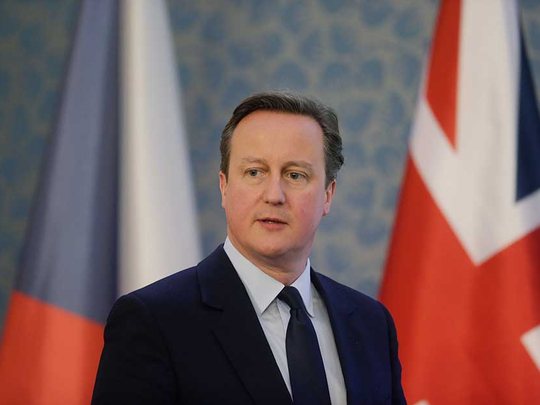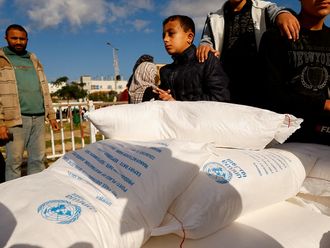
Before David Cameron launched himself this week into a critique of the English language skills of Muslim women in the UK, he would have done well to take a tour of Tate Britain’s exhibition Artist and Empire.
It’s a deeply unsettling reminder of a past that the British have made an art of half-forgetting. This is painting by the square metre: huge canvases to demonstrate the struggle and the glory of British expansionary militarism. It’s a reminder that spreading that pink across the globe was a brutally violent process. But it was the undercurrent of erotic thrill to empire that is even more disturbing. Imperial maps are bordered by large-breasted maidens holding cornucopia brimming with exotic fruits for the conqueror. One portrait of a coy, bare-breasted woman was that of a hostage imprisoned by James Cook in his cabin as part of negotiations with a recalcitrant indigenous people in the Pacific. Empire offered an abundance of available women; in contrast the imperialists’ womenfolk are dressed and presented in domestic settings, safely established under male control as wives and daughters.
Women’s lives — and bodies — have long been one of the key battlegrounds used by the west to stake out its claim to being a superior civilisation and at the same time cast those it wishes to subjugate as barbaric.
“White man rescuing brown women” was the thrill of empire, whereby desire for domination could be masked as virtuous duty. That was also the gist of Cameron’s intervention; ironically, his twist on this old theme was that Muslim women are not available — for the labour market. They are kept at home and are “economically inactive”, that new slur of disdain in hard-working Britain. He is not interested if they are caring for children or elderly relatives. In the Muslim homes I have visited it was clear that the women were extremely busy cooking and caring for many family members. The white man saving brown women trope has been the subject of extensive criticism as a form of “colonial feminism” which erupted with new force during the 2001 invasion of Afghanistan with interventions from both Laura Bush and Cherie Blair to “save” Afghan women, and was regularly repeated during the occupation as a way to justify military intervention. A CIA memo revealed by WikiLeaks advised European governments on how the suffering of Afghan women might bolster flagging public support for the occupation of Afghanistan, “initiatives that create media opportunities for Afghan women to share their stories with French, German and other European women could help to overcome pervasive scepticism in western Europe”.
What was omitted by these enthusiastic advocates of women’s rights in Afghanistan was the history of how in the 80s western-sponsored mujahideen had dismantled so many women’s opportunities in education, employment and health. When Afghanistan was a front in the cold war, women’s rights were irrelevant. Their plight was used to claim civilisational superiority, and to argue that the west had a monopoly on freedom and human rights, which, if necessary, would be imposed by force. Forced to be free is an absurd paradox, warn a succession of longtime observers of Muslim women’s grassroots movements. A Harvard anthropologist, Lila Abu Lughod, comments that: “Saving Muslim women allows us to ignore the complex entanglements in which we are all implicated and creates a polarisation that places feminism only on the side of the west.”
The development of female empowerment and how to define freedom is a process that must emerge from within a culture, she argues in her book, Do Muslim Women Need Saving? Cameron’s anxieties about segregation suggest he would do well to read a copy.
Victorian imperialist fantasies might seem a long way from Cameron’s intervention but they are both part of the same tradition claiming western superiority. (Remember, Cameron maintains that his favourite childhood book was the 1905 Our Island Story; he is a child of empire.) It’s this history that goes some way towards explaining what he was up to. First, let’s get one thing clear: Cameron is not particularly interested in budgets for teaching English to migrants. He doesn’t care particularly about the Muslim women whose English is not up to scratch, who form 0.3 per cent of the population.
If he was, he would not have cut £400 million in funding for English language teaching in the last five years; reinstituting £20 million was a paltry sop.
His intervention last week was not about sensible policy or even about an effective response to radicalisation. It was a set of postures designed to meet pressing political problems about British identity that dominate the Conservative political agenda: just who exactly are the British and, if we knew, how would we make it clear?
In a year in which the Conservative party could tear itself apart over the issue, when Ukip is ever at its heels, Cameron wants to strike the rhetorical notes that look like he has the answer. To do that he has rummaged in the proverbial prop box of history and followed an age-old rule: demonise the other as a way to define and aggrandise yourself. Rally the group by focusing on the one excluded. Use the old trick of offering to save brown women.
The style of his sweeping comments bore some striking resemblances with the grand paintings in the Tate’s exhibition. There was the faux-humility of the self-deprecating criticism — Cameron’s “we bear much of the blame”, which blurs the brutal edges of the threat (deportation for spouses if their English is not good enough). And there was the sound of the white man, heaving his burden on to his back: “We have a duty,” he declared.
Cameron’s muscular action-man language of “clear thinking”, “hard truths” and “clear and positive agenda” is of a kind with those haughty imperialists hanging on the Tate’s walls. It may be tawdry stuff, but the problems he faces are real. The western hegemony of the last two and half centuries is crumbling; the last 15 years have seen a series of spectacular military failures. Worst of all, western governments are struggling to demonstrate competence and effectiveness in responding to the radicalisation of a small minority of dedicated and ruthless terrorists whose violence is deliberately exploiting the underlying tensions of multiculturalism to ratchet up internal conflict.
The tragedy is that multiculturalism is not a passive option, as wilfully misrepresented by Cameron. Without support at the grassroots, migrant communities can turn inwards, which is then compounded by problems of endemic poverty. Its success requires hard work to build relationships and self-confidence, and develop communities. It is such painstaking work that has been badly hit by funding cuts.
Reaching out to offer opportunities to women is vital, but its success all lies in the detail of how it is done and with what intention. There are local authorities whose attempts to develop successful multiculturalism have been undermined and thwarted by the posturing of Westminster politicians such as Cameron.
What is so desperately frustrating is how political leaders seem powerless to deviate from the script laid down for them by Daesh (the self-proclaimed Islamic State of Iraq and the Levant). Cameron’s charade of imperial tropes plays into exactly the clash of civilisations paradigm that Daesh is using to bring about conflict. No issue is more likely to incense Muslim families than targeting their mothers and grandmothers; it will be seen as a threatening and unwarranted intrusion into their private domestic lives.
— Guardian News & Media Ltd











